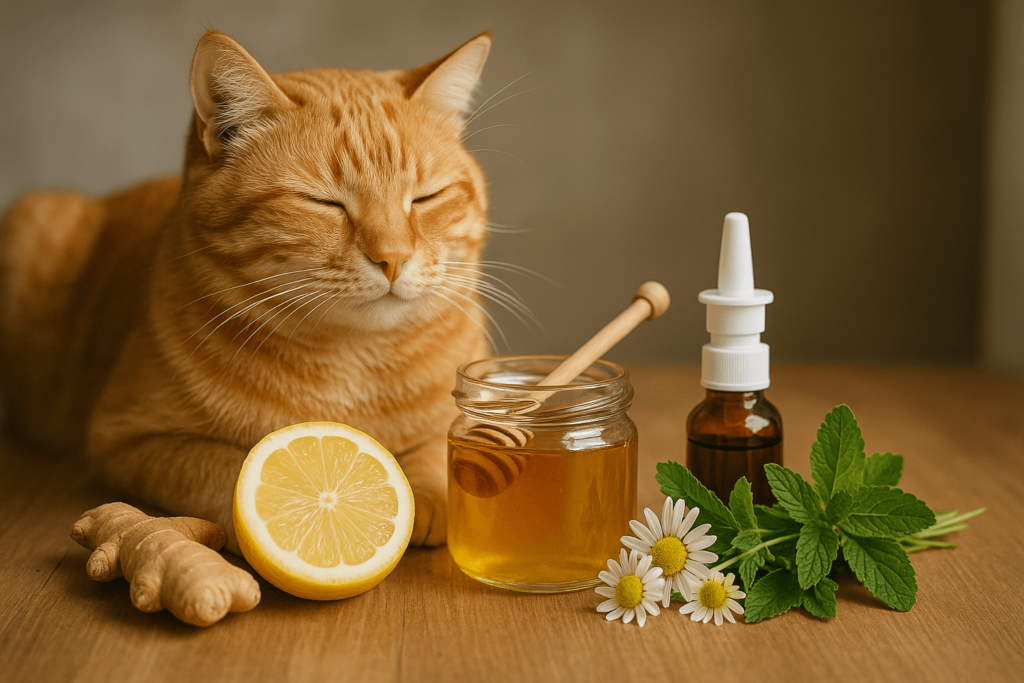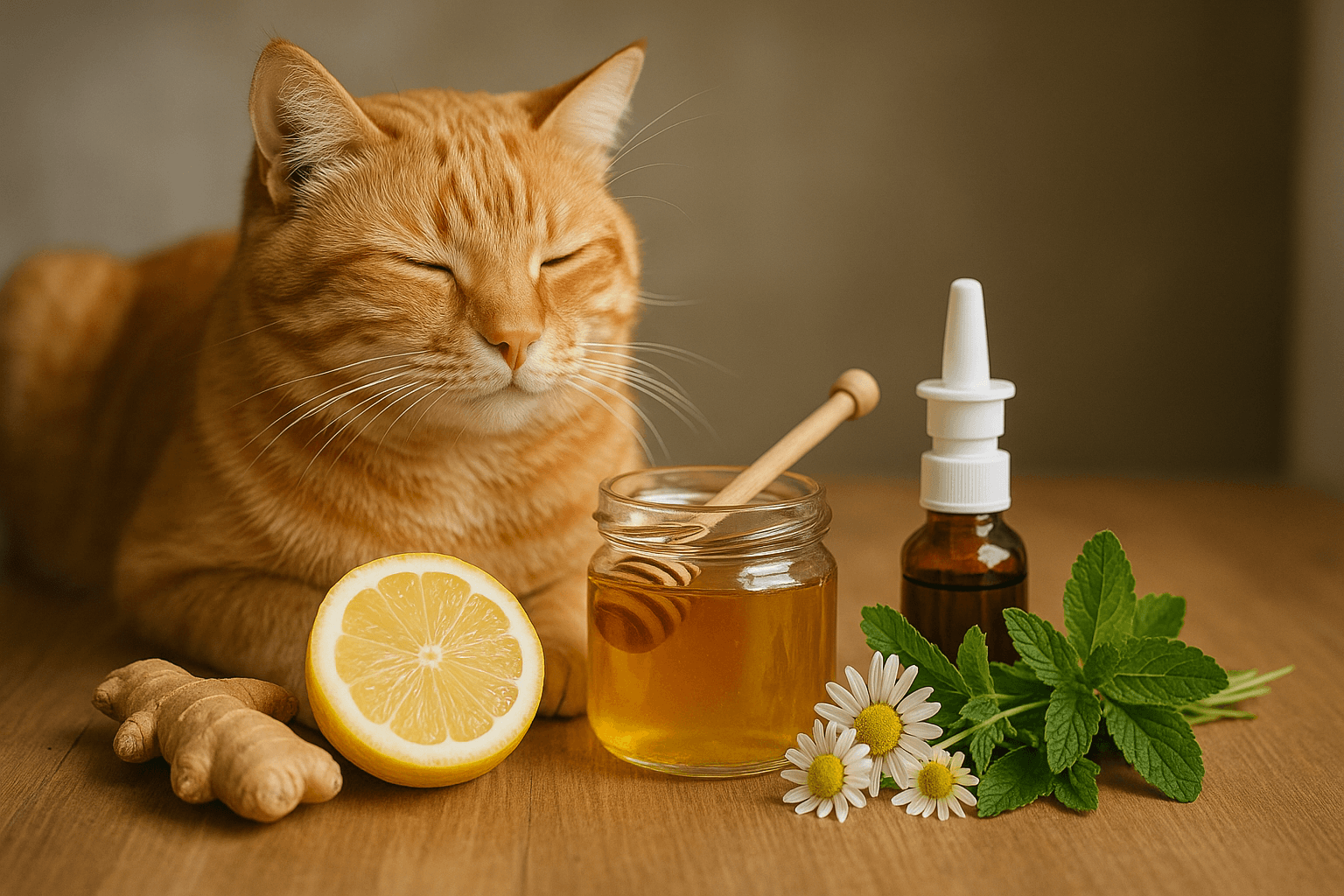Natural Cat Allergy Remedies: Finding Relief for You and Your Furry Friend
Cat allergies are a common challenge for pet lovers, causing symptoms like sneezing, itchy eyes, and respiratory discomfort. While many people consider giving up their beloved feline companions, there are natural remedies that can help alleviate these symptoms without saying goodbye to your furry friend. From environmental adjustments to dietary changes, this blog post explores effective strategies to manage cat allergies naturally. Whether you’re a long-time cat owner or considering adopting one, these tips will help you create a harmonious home where both you and your cat can thrive.
Simple Environmental Adjustments to Reduce Allergens
One of the most effective ways to manage cat allergies is by making small changes to your living space. These adjustments can significantly reduce allergen exposure while keeping your home comfortable for everyone.
Use Air Purifiers:
Invest in high-quality air purifiers with HEPA filters to trap airborne allergens, including cat dander, and improve indoor air quality.Wash Bedding Frequently:
Wash your bedding, curtains, and any fabric your cat comes into contact with at least once a week to remove accumulated dander.Create Cat-Free Zones:
Designate certain areas of your home, such as your bedroom, as off-limits to your cat to minimize allergen exposure during rest.Vacuum Regularly:
Use a vacuum cleaner with a HEPA filter to clean carpets, rugs, and furniture where dander tends to accumulate.Declutter Your Space:
Reduce clutter in your home to minimize surfaces where allergens can settle and linger.
By implementing these environmental adjustments, you can create a cleaner, healthier space that reduces allergy symptoms and enhances your quality of life.

Natural Supplements and Remedies for Cat Allergies
In addition to environmental changes, incorporating natural supplements and remedies into your routine can provide relief from cat allergy symptoms. These options support your immune system and reduce inflammation caused by allergens.
Quercetin:
This plant-based flavonoid acts as a natural antihistamine, helping to block allergic reactions and reduce inflammation.Probiotics:
Supporting gut health with probiotics can strengthen your immune system and improve your body’s response to allergens.Neti Pot with Saline Solution:
Using a neti pot to rinse your nasal passages can clear out allergens and soothe sinus irritation caused by cat dander.Butterbur Extract:
This herbal remedy has been shown to reduce allergy symptoms without the side effects often associated with over-the-counter medications.Local Honey:
Consuming local honey may help desensitize your body to allergens by exposing you to small amounts of pollen and other environmental triggers.
These natural remedies offer gentle yet effective ways to manage cat allergies while promoting overall wellness.
Check this guide 👉Understanding Cat Allergy Tests: Best 7 Health Tips!
Check this guide 👉Swollen Eyes from Cat Allergies: Best 7 Expert Tips!
Check this guide 👉Benadryl for Cat Allergy: Best 7 Expert Tips!
Lifestyle Changes for Allergy Relief | Benefits of Natural Remedies |
|---|---|
Frequent cleaning and vacuuming | Reduces reliance on synthetic medications |
Using HEPA air purifiers | Supports long-term immune health |
Creating cat-free zones | Minimizes direct allergen exposure |
Washing hands after handling cats | Eases symptoms naturally and safely |
Grooming your cat regularly | Promotes holistic well-being |
Grooming Tips to Minimize Cat Dander
Regular grooming not only keeps your cat healthy but also helps reduce the amount of dander they shed around your home. Here are some tips to make grooming effective and stress-free.
Brush Your Cat Daily:
Use a grooming brush designed to trap loose hair and dander, reducing the amount that ends up on furniture and clothing.Bathe Your Cat Occasionally:
While cats typically groom themselves, an occasional bath with hypoallergenic shampoo can remove excess dander and allergens.Wipe Your Cat’s Fur:
Use a damp cloth or pet-safe wipes to gently wipe down your cat’s fur between baths, capturing loose particles.Trim Excess Hair:
Keeping your cat’s coat trimmed (if applicable) can minimize shedding and reduce the spread of allergens.Consider Professional Grooming:
If grooming at home proves challenging, seek help from a professional groomer experienced with hypoallergenic care.
With consistent grooming habits, you can significantly decrease the amount of dander in your home and alleviate allergy symptoms.
Dietary Adjustments for Cats to Reduce Allergens
Believe it or not, what your cat eats can influence the production of allergens. Making dietary changes can improve their skin and coat health, reducing the allergens they produce.
Omega-3 Fatty Acids:
Adding omega-3 supplements or foods rich in these fatty acids can promote healthier skin and reduce dander production.High-Quality Protein Sources:
Ensure your cat’s diet includes high-quality proteins that support overall health and reduce skin irritation.Hydration is Key:
Encourage your cat to drink more water or switch to wet food to keep their skin hydrated and less prone to flaking.Limited Processed Ingredients:
Avoid foods with artificial additives, which can exacerbate skin issues and increase allergen output.Consult Your Veterinarian:
Work with your vet to identify potential dietary triggers and tailor a nutrition plan specific to your cat’s needs.
By focusing on your cat’s diet, you can address the root cause of allergens and create a healthier environment for everyone.
Common Mistakes to Avoid When Managing Cat Allergies
While addressing cat allergies, it’s easy to fall into habits that might worsen the situation. Avoiding these common mistakes ensures your efforts remain effective and sustainable.
Neglecting Regular Cleaning:
Skipping cleaning routines allows allergens to build up, making symptoms worse over time.Using Harsh Chemicals:
Strong cleaning products can irritate your respiratory system and harm your cat’s health. Opt for natural alternatives instead.Overlooking Personal Hygiene:
Forgetting to wash your hands or change clothes after handling your cat can transfer allergens throughout your home.Skipping Vet Checkups:
Ignoring your cat’s skin or coat health can lead to increased dander production. Regular vet visits are essential.Expecting Immediate Results:
Natural remedies and lifestyle changes take time to show effects. Be patient and persistent.
Avoiding these pitfalls ensures your allergy management plan stays on track and delivers lasting benefits.
Benefits of Hypoallergenic Cat Breeds
If you’re considering adopting a cat but worry about allergies, hypoallergenic breeds might be worth exploring. These breeds produce fewer allergens, making them a better fit for sensitive individuals.
Siberian Cats:
Known for producing lower levels of Fel d 1 protein, the primary allergen in cat saliva.Balinese Cats:
A long-haired breed that sheds less, resulting in reduced allergen distribution.Cornish Rex Cats:
Their short, curly coats minimize shedding and dander accumulation.Devon Rex Cats:
Another low-shedding breed with fine, soft fur that produces fewer allergens.Russian Blue Cats:
Produces less Fel d 1 protein and has a dense coat that traps dander close to the body.
Choosing a hypoallergenic breed can make cohabitation easier for allergy sufferers while still allowing you to enjoy feline companionship.
Emotional Support Strategies for Coping with Allergies
Living with cat allergies can sometimes feel overwhelming, but emotional support strategies can help you cope and maintain a positive outlook.
Join Online Communities:
Connecting with others who share similar experiences provides encouragement and practical advice.Practice Mindfulness Techniques:
Meditation or deep breathing exercises can reduce stress and improve your resilience to allergy symptoms.Set Realistic Expectations:
Accept that managing allergies is an ongoing process and celebrate small victories along the way.Focus on Bonding Moments:
Spend quality time with your cat doing activities that don’t trigger your allergies, such as watching them play.Seek Professional Counseling:
If allergies affect your mental health, speaking with a therapist can help you navigate feelings of frustration or sadness.
By prioritizing emotional well-being, you can maintain a positive relationship with your cat despite the challenges of allergies.
Frequently Asked Questions About Natural Cat Allergy Remedies
Can I develop an immunity to my cat’s dander?
Some people report reduced sensitivity over time, but results vary. Consult an allergist for personalized advice.
Are air purifiers effective against cat allergies?
Yes, HEPA air purifiers can significantly reduce airborne allergens, including dander, in your home.
How often should I groom my cat?
Daily brushing is ideal, especially for long-haired breeds, to minimize shedding and dander buildup.
Do natural remedies work for severe allergies?
Natural remedies can complement traditional treatments but may not fully replace them for severe cases.
What if my cat dislikes grooming?
Start slowly, use treats as rewards, and consider professional grooming services if needed.
Living Harmoniously with Your Cat Despite Allergies
Managing cat allergies doesn’t mean giving up the joy of sharing your life with a feline companion. By combining environmental adjustments, natural remedies, and thoughtful grooming practices, you can create a balanced approach that works for both you and your cat. Remember, patience and consistency are key—these strategies take time to show results but can lead to significant improvements in your quality of life. With the right tools and mindset, you can enjoy the love and companionship of your cat while keeping allergy symptoms under control.
Newfoundland Dog Personality: Best 7 Expert Tips! – Discover the gentle, loyal, and protective nature of this giant breed perfect for families.
Can Hot Pavement Burn Your Cats Paws? Best 7 Expert Tips! – Learn how to protect your cat’s paws from hot surfaces and prevent painful burns this summer.
Can Hot Pavement Burn Your Dogs Paws? Best 7 Expert Tips! – Learn how to protect your dog’s paws from hot surfaces and ensure safe summer walks.
Irish Wolfhound Size: Best 7 Expert Tips! – Discover the ideal height, weight, and care tips for this majestic giant breed. Learn how to manage their impressive stature responsibly.





